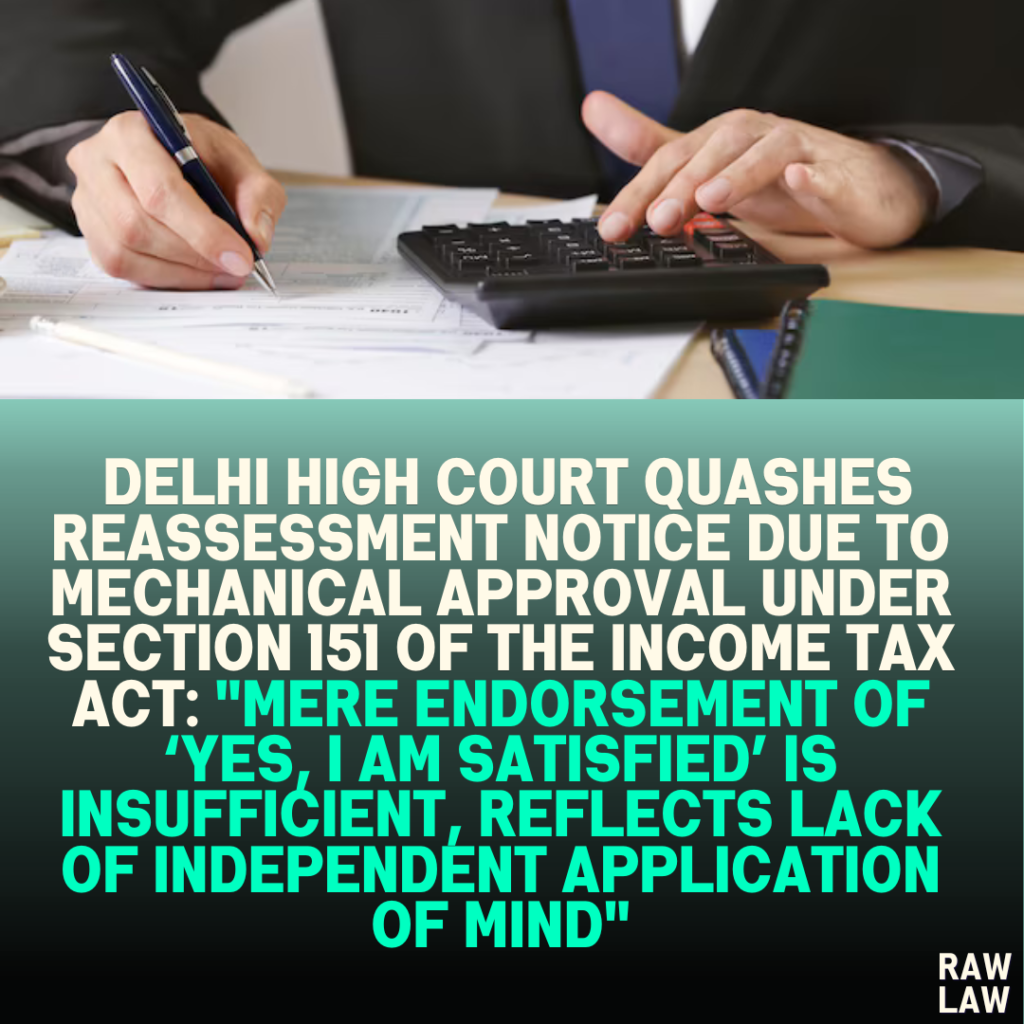Court’s Decision:
The Delhi High Court quashed the notice issued under Section 148 of the Income Tax Act, 1961 for reassessment of income, citing that the approval by the Principal Commissioner of Income Tax (PCIT) was granted in a mechanical manner without application of mind. The court emphasized that the use of phrases such as “Yes, I am satisfied” by the approving authority does not reflect proper consideration of the material facts and reasons provided by the Assessing Officer (AO). The bench held that such approvals lack the requisite satisfaction mandated under Section 151 of the Act, rendering the reassessment notice invalid.
Facts:
- The petitioner had filed a return of income on 05.08.2010 for the Assessment Year 2010-11, declaring an income of Rs. 1,95,711/-.
- The return was processed under Section 143(1) of the Act, but no assessment order was passed.
- Later, the Investigation Wing of the Income Tax Department received information about money laundering operations conducted by certain entities. It was alleged that the petitioner company had received accommodation entries aggregating to Rs. 55 lakhs through three paper companies managed by a known group.
- Based on this information, a notice under Section 148 was issued on 28.03.2017, alleging that there had been an escapement of income.
- The petitioner filed a writ petition challenging the notice and the approval accorded under Section 151 of the Act by the PCIT, contending that the approval was mechanical and without proper examination of the material.
Issues:
- Whether the sanction granted under Section 151 by the PCIT was valid and in compliance with the statutory requirements?
- Whether the approval granted merely using phrases such as “Yes, I am satisfied” without any reasoning constitutes a valid exercise of discretion under the Income Tax Act?
Petitioner’s Arguments:
- The petitioner argued that the PCIT granted approval without application of mind by merely endorsing his signature on the proforma.
- It was contended that the PCIT was influenced by the sanction of the Additional Commissioner Income Tax (ACIT) and failed to independently consider the reasons recorded by the AO.
- The petitioner emphasized that such an approach violates the principle of independent satisfaction as required under Section 151, making the notice void.
Respondent’s Arguments:
- The respondent argued that the statutory requirement under Section 151 is limited to the approval of the reasons recorded by the AO.
- The PCIT was not required to give elaborate reasons for the approval and that the noting “Yes, I am satisfied” fulfilled the requirement of the law.
- It was asserted that the PCIT examined the detailed reasons provided by the AO and was satisfied that income had escaped assessment.
Analysis of the Law:
- The court scrutinized the provisions of Section 151 of the Income Tax Act, which requires the PCIT to be “satisfied” on the reasons recorded by the AO before granting approval for reopening assessments.
- Referring to multiple precedents, including the decisions in SBC Minerals Pvt. Ltd. and Yum! Restaurants Asia Pte. Ltd., the court held that the satisfaction of the approving authority should be based on an independent evaluation of the reasons and material placed before it.
- The court highlighted that mere mechanical approvals in a stereotyped manner without any reasoning render the sanction legally unsustainable.
Precedent Analysis:
- SBC Minerals Pvt. Ltd. vs. Assistant Commissioner of Income Tax: The court held that satisfaction of the prescribed authority under Section 151 must be discernible and cannot be merely formal or ritualistic.
- Yum! Restaurants Asia Pte. Ltd v. Deputy Director of Income Tax: This case clarified that the purpose of Section 151 is to introduce a supervisory check, ensuring that reopening is based on a well-reasoned basis.
- N.C. Cables Ltd. v. Commissioner of Income Tax: The court emphasized that mechanical approvals using phrases like “approved” are insufficient as they do not demonstrate independent application of mind.
Court’s Reasoning:
The bench pointed out that the PCIT’s approval order lacked any reference to the material considered, making it impossible to discern whether there was any independent satisfaction. The mere endorsement of “Yes, I am satisfied” amounted to a ritualistic exercise rather than meaningful consideration. The court observed that reasons are the link between the material on record and the conclusion reached by the authority, and such a casual approach fails to meet the statutory requirements under Section 151.
Conclusion:
The court set aside the reassessment notice issued under Section 148 and held that the approval granted by the PCIT was not valid. The judgment reinforces the need for a proper and considered approval process under Section 151, emphasizing that mechanical endorsements do not fulfill the legal mandate.
Implications:
This ruling underscores the strict scrutiny required for approvals under Section 151 of the Income Tax Act. The judgment serves as a reminder to the Revenue authorities that approvals for reopening assessments must reflect independent satisfaction based on the material on record. This decision is likely to impact future reassessment proceedings, mandating a more detailed and considered approach by the approving authorities.



